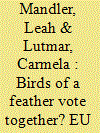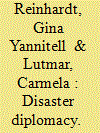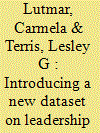|
|
|
Sort Order |
|
|
|
Items / Page
|
|
|
|
|
|
|
| Srl | Item |
| 1 |
ID:
177571


|
|
|
|
|
| Summary/Abstract |
UN General Assembly (UNGA) voting is non-binding, unlike voting in the Security Council (UNSC), yet is considered to reflect states’ interests. This article attempts to explore, compare, and explain patterns in UNGA voting of two regional organisations (ROs) on Israel-related resolutions, and/or issues that are of importance to Israel. Israel has been a unique case when it comes to the UN, which has shown pervasive hostility towards the Jewish state over the past decades (e.g. 83 of the 97 UNGA resolutions criticising countries in 2012–15 [or 86%] were directed against Israel). While most researchers agree that ROs differ in the level of their group vote uniformity, this article argues that states’ voting on resolutions related to Israel also varies within ROs and over time. As such, it sheds light on internal changes within the examined ROs (the Arab League and the EU) and shows important differences among members of these organisations.
|
|
|
|
|
|
|
|
|
|
|
|
|
|
|
|
| 2 |
ID:
184187


|
|
|
|
|
| Summary/Abstract |
The COVID-19 pandemic has drawn worldwide attention to the difficulties inherent in managing disasters. Scholars across disciplines have been forced to consider the impact disasters have on interstate relations, state resilience, patterns of violence and hostility, and the vulnerabilities that condition conflict. This special issue offers new insights to help disentangle the relationship between disasters, conflict, and cooperation, by adhering to a three-pronged theoretical framework. First, all pieces in this issue are underpinned by a unified understanding of disasters as endogenous social phenomena. Second, we acknowledge that disasters occur as processes rather than discrete events. Finally, we explore the possibility that disasters and conflict are co-determined by a common set of factors. The articles herein were chosen not only because they advance academic thought about the disaster–conflict nexus, but also because of their potential to advance the practical impact of this line of research on the global conflict and disaster landscape. We highlight the relevance of this special issue for further work investigating the effects of conflict on disasters and the relationship between the hazards cycle process and patterns of violence and hostility, as well as the implications of adopting this suggested framework for policymaking and data collection.
|
|
|
|
|
|
|
|
|
|
|
|
|
|
|
|
| 3 |
ID:
165456


|
|
|
|
|
| Summary/Abstract |
Leaders and leadership changes are found to influence states’ foreign policy decisions, in particular with respect to war and peace between states. Although this issue is also addressed in the qualitative literature on intrastate wars, the influence of leadership turnovers in civil war has received limited systematic attention. One reason for this is the scarcity of quantitative data on rebel group leaderships. To fill this gap, we present a comprehensive dataset on leadership changes in rebel groups, 1946–2010, organized by rebel-month. The effects of leadership changes among parties engaged in civil war are argued to be more complex than those found in interstate disputes. In this article we present our theoretical argument followed by presentation of the variables in the dataset and descriptive statistics. To demonstrate the potential research value of the dataset we examine the impact of leader shifts on civil war settlement in Africa. We conclude with avenues for future research which might benefit from this dataset.
|
|
|
|
|
|
|
|
|
|
|
|
|
|
|
|
|
|
|
|
|